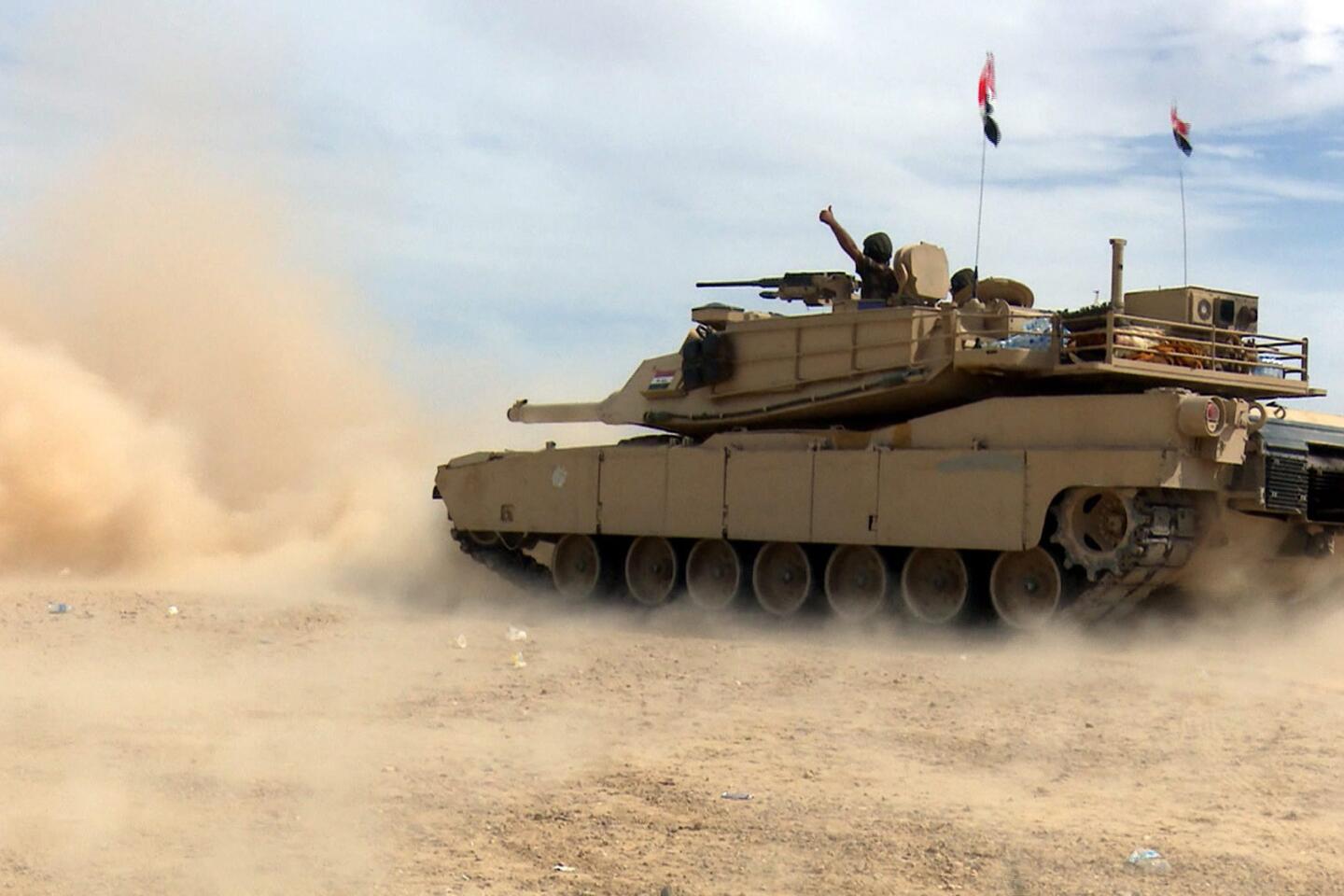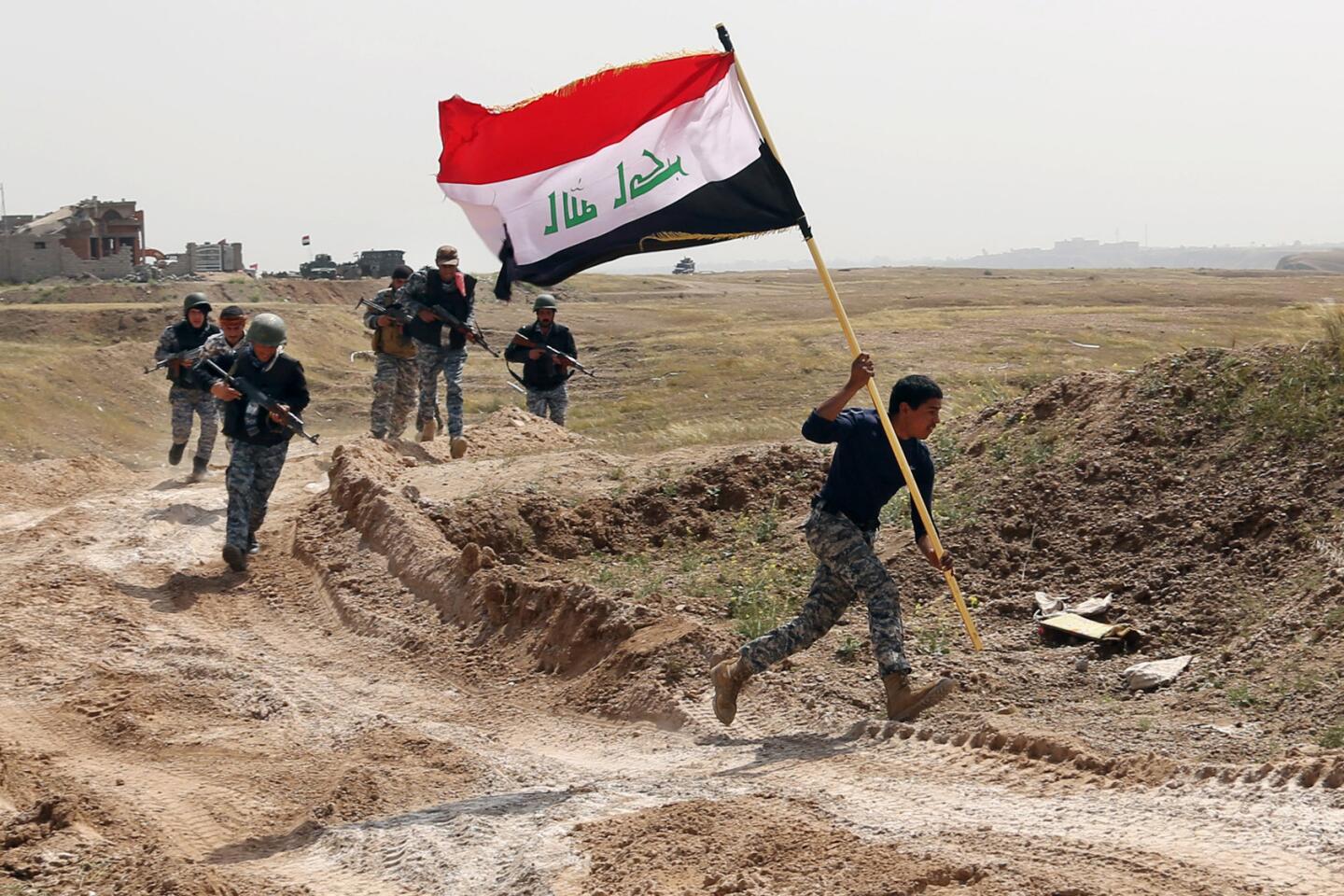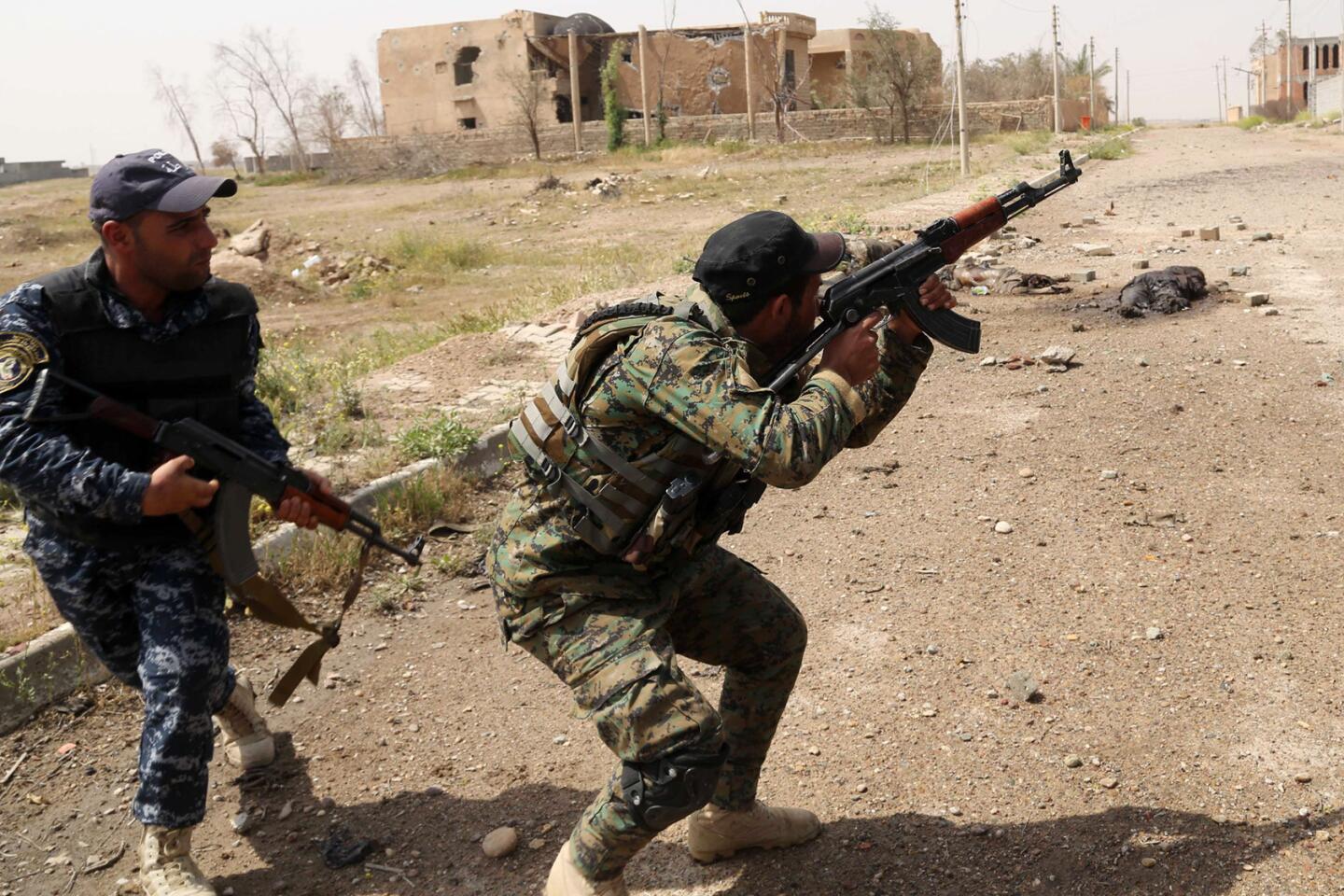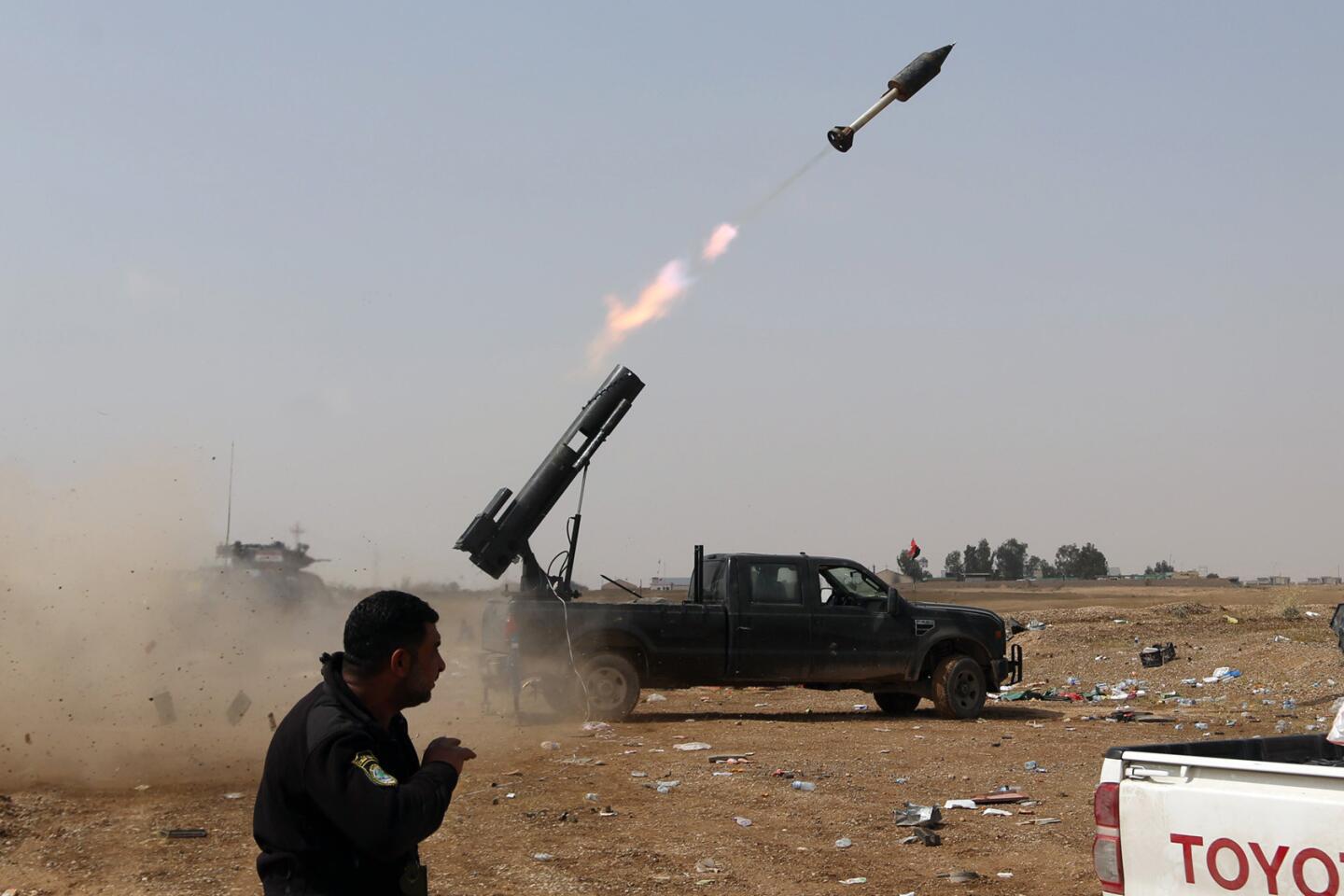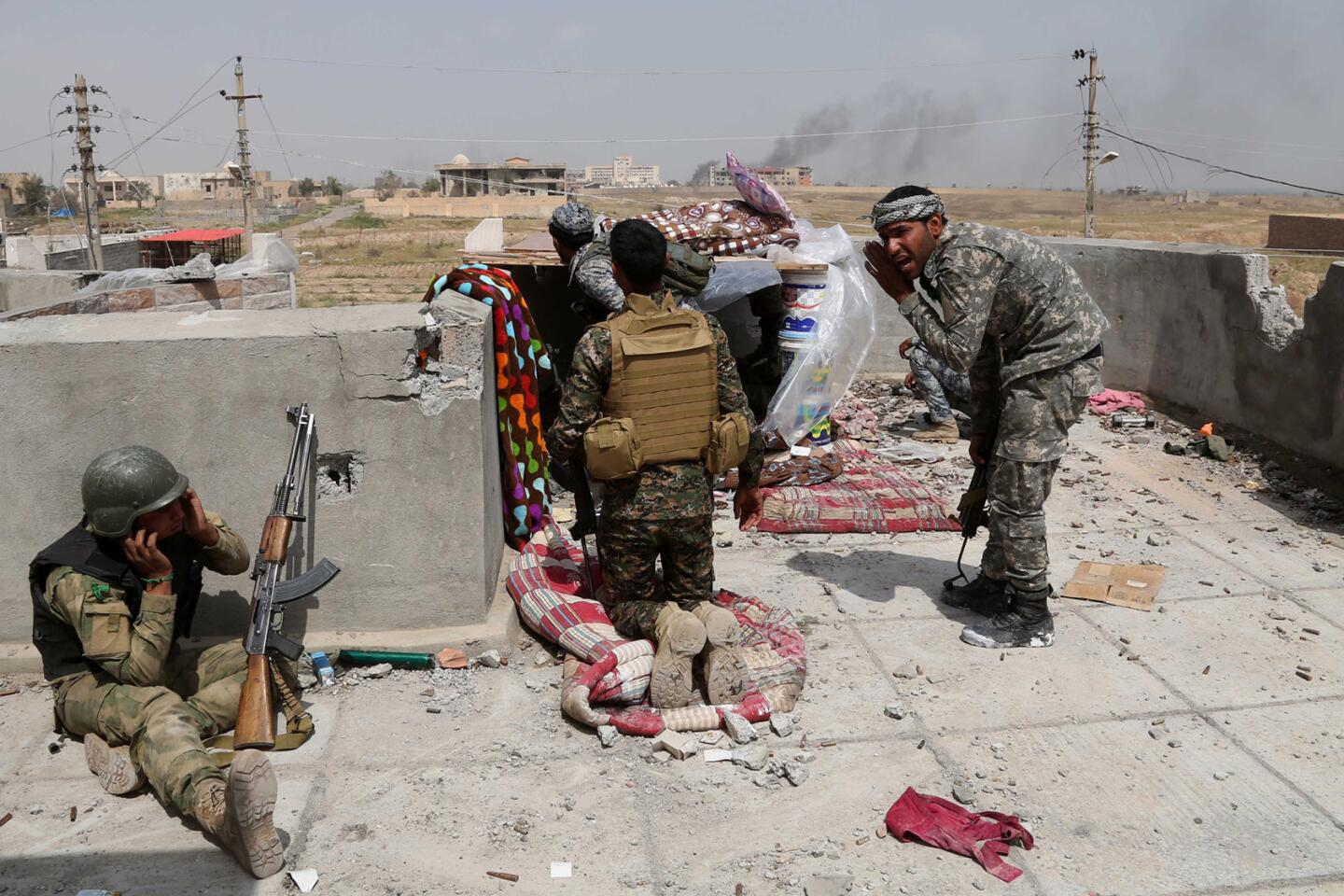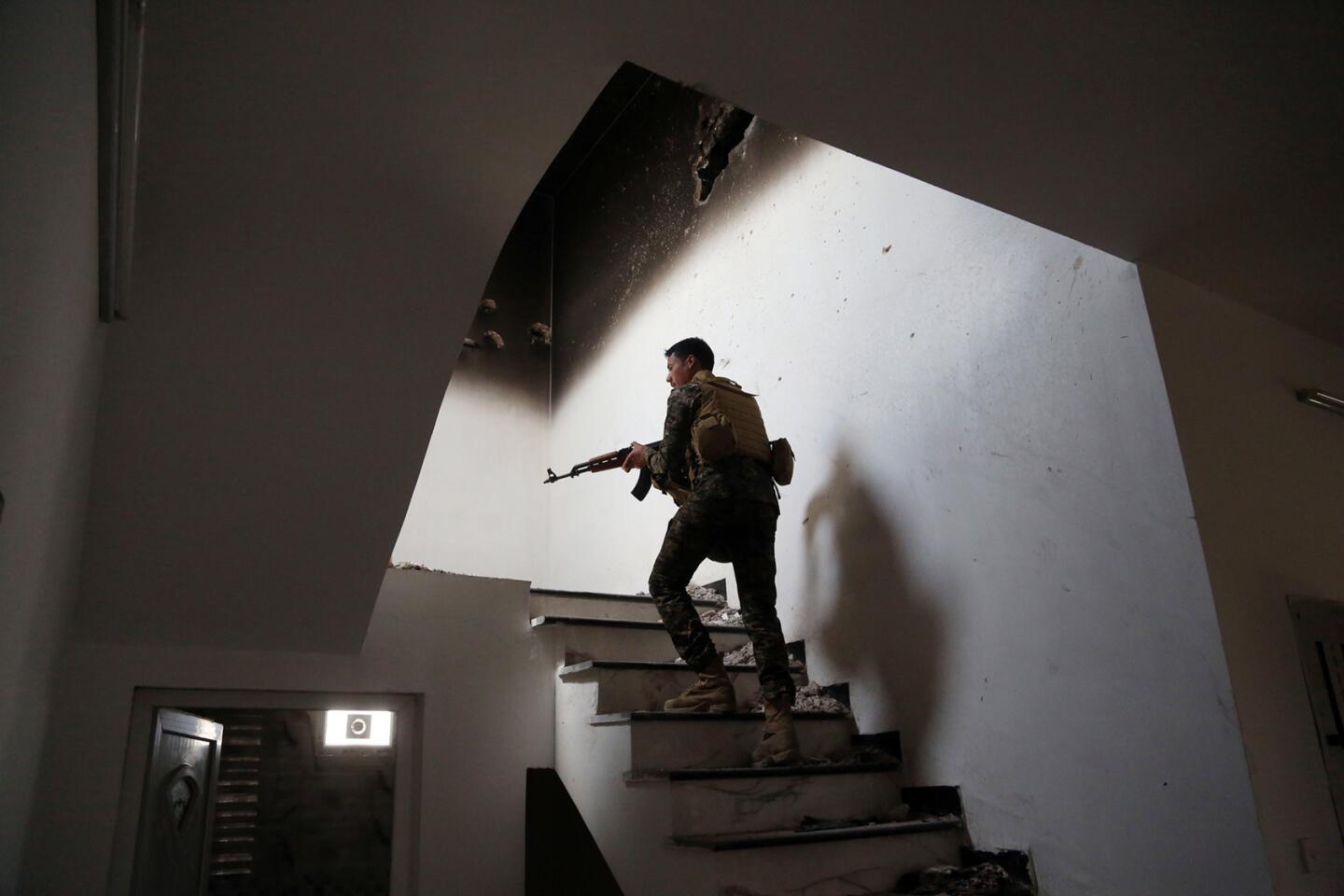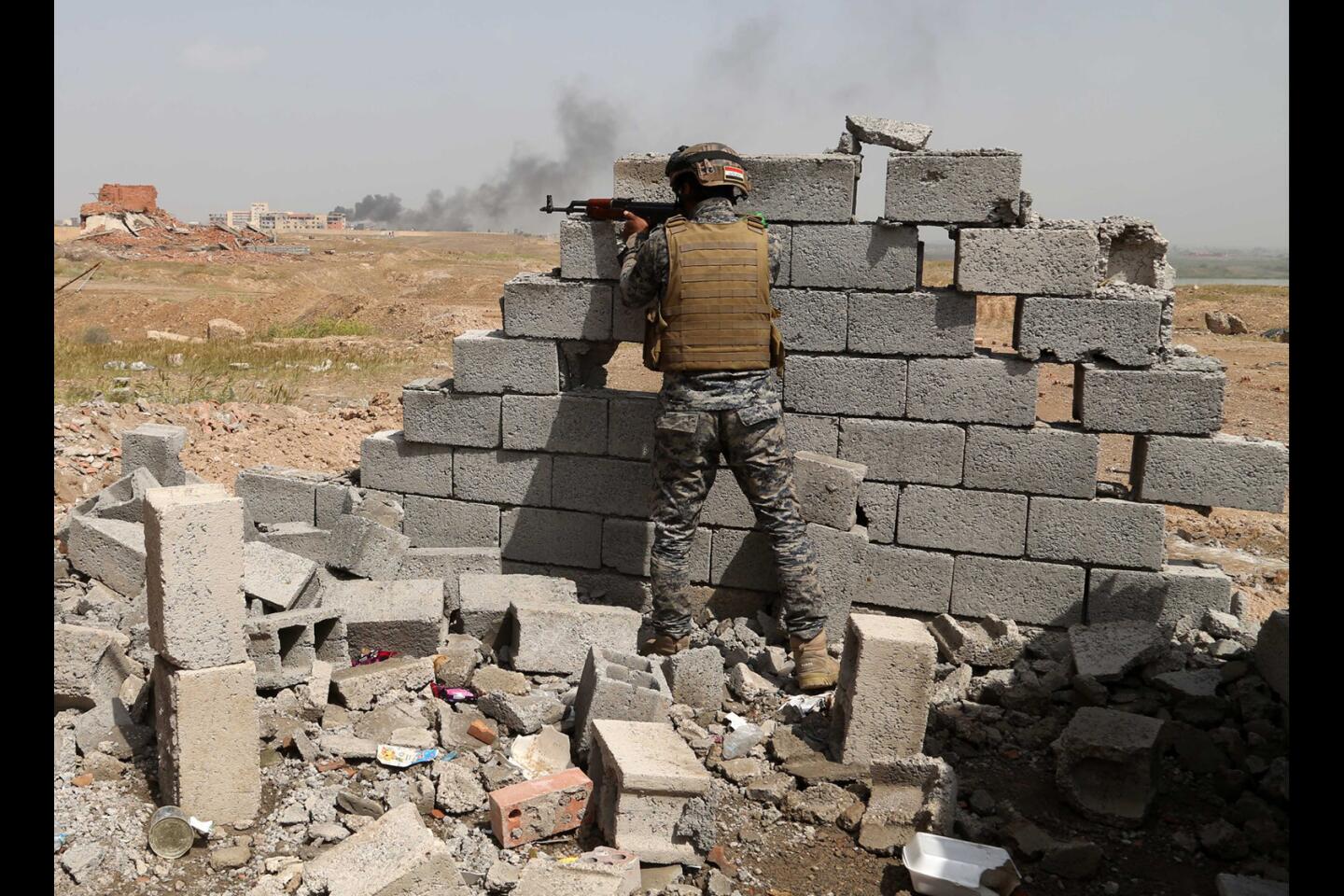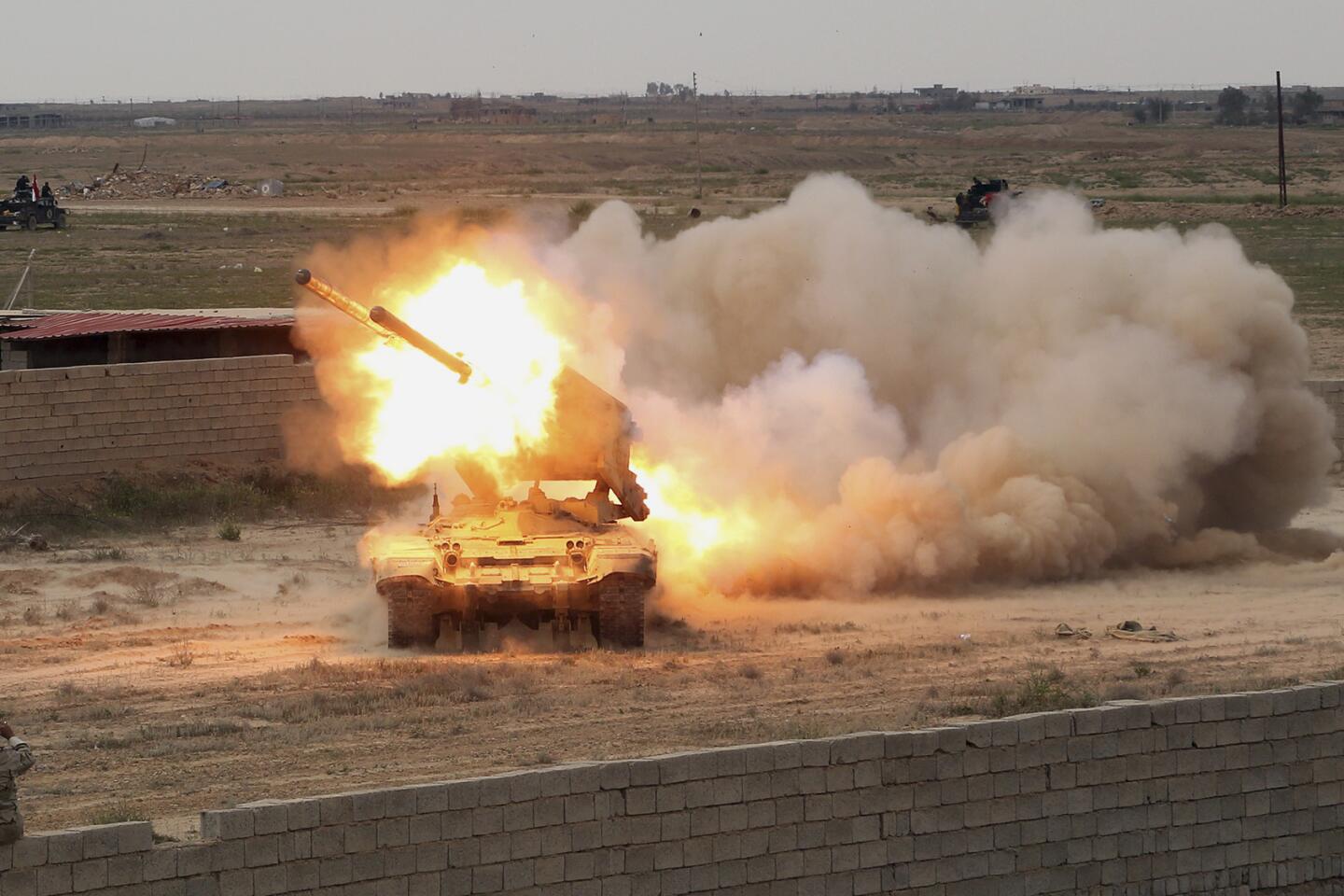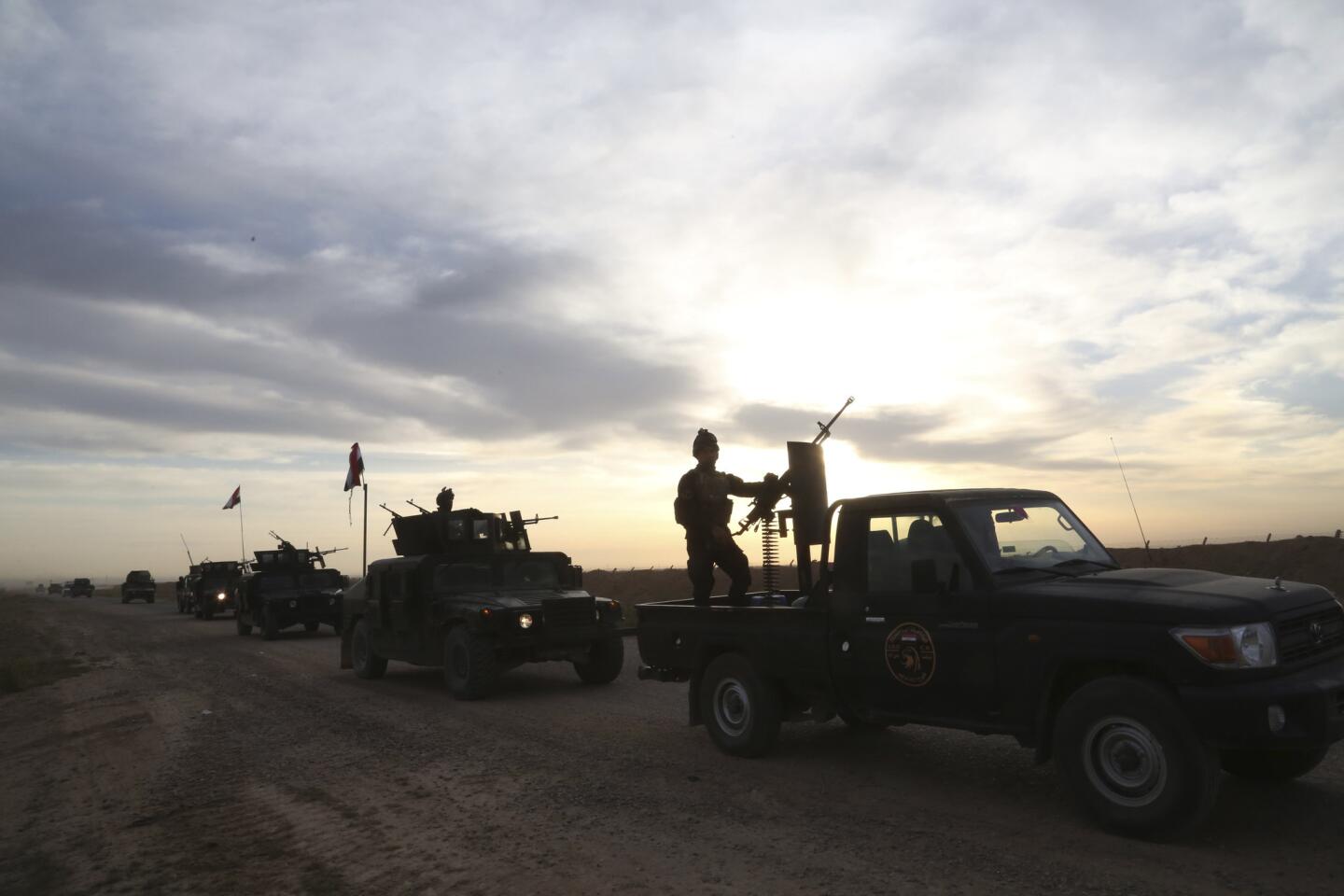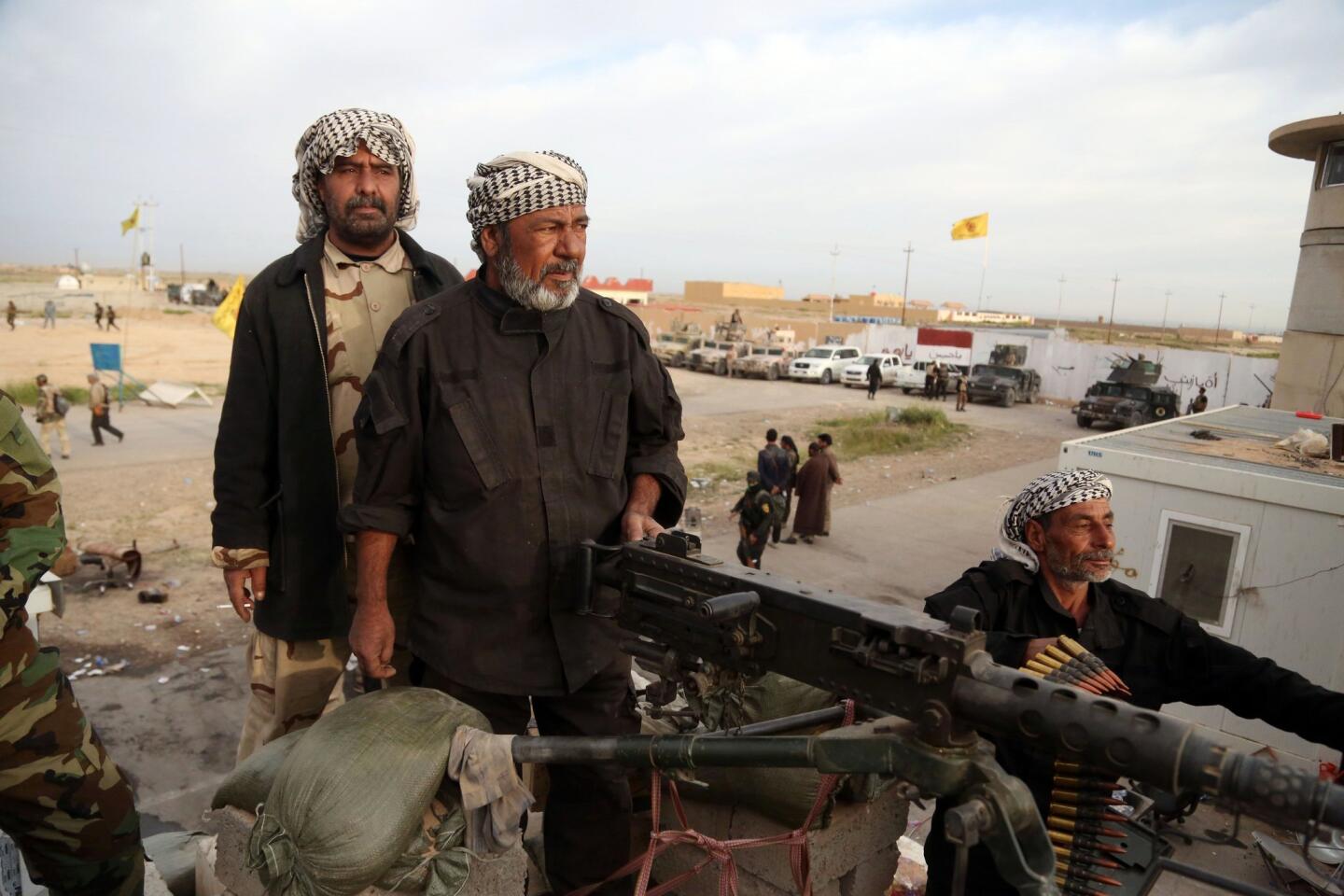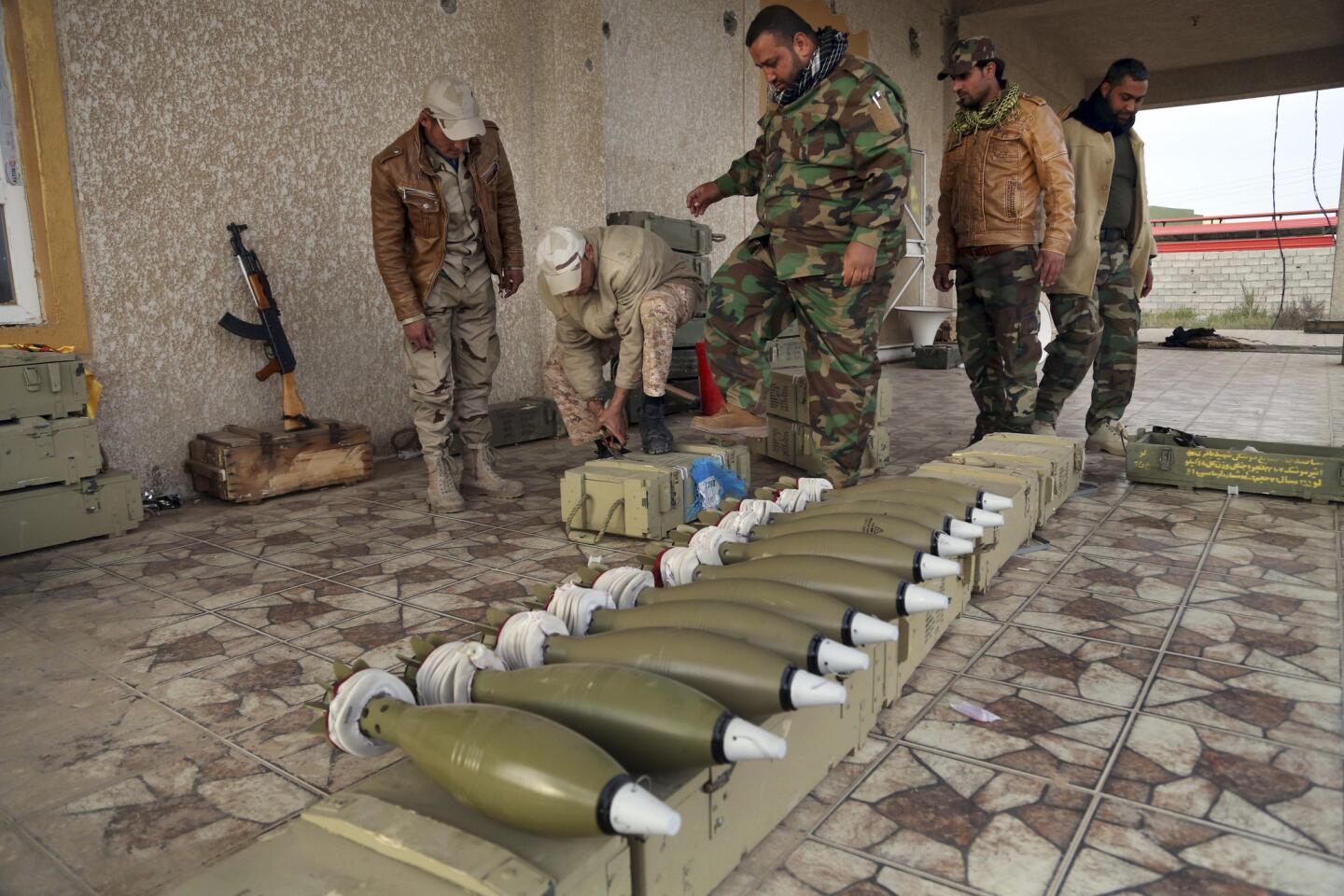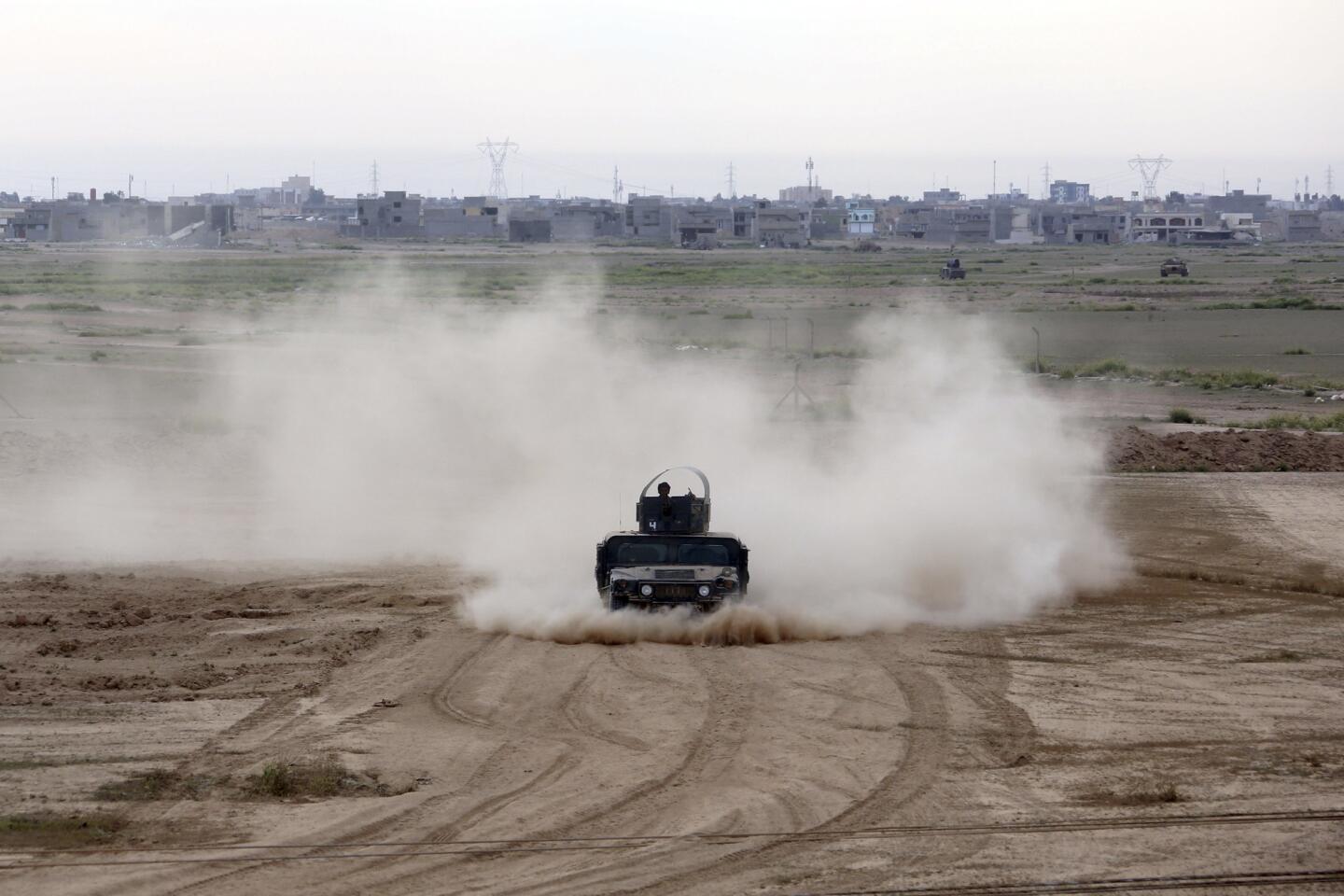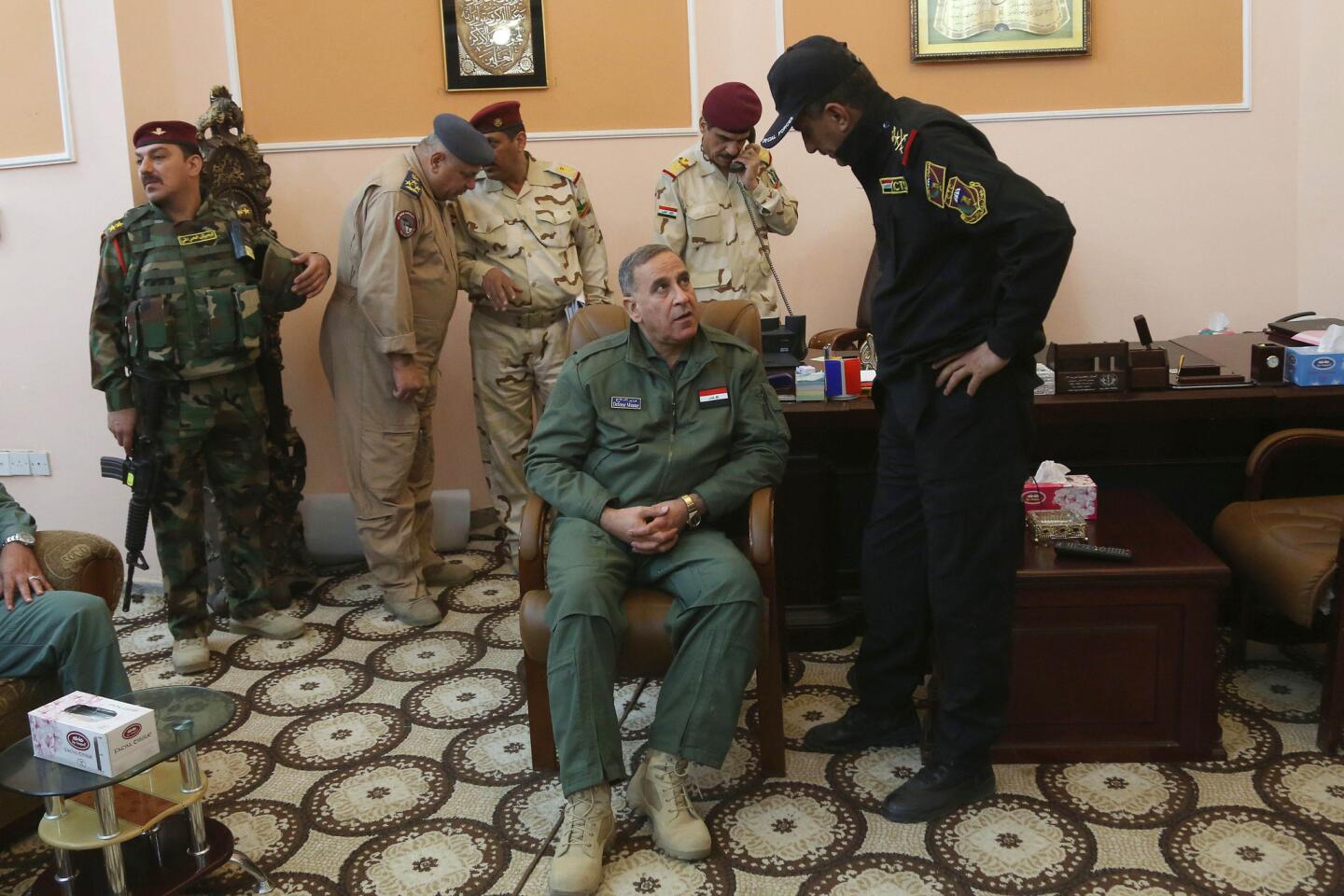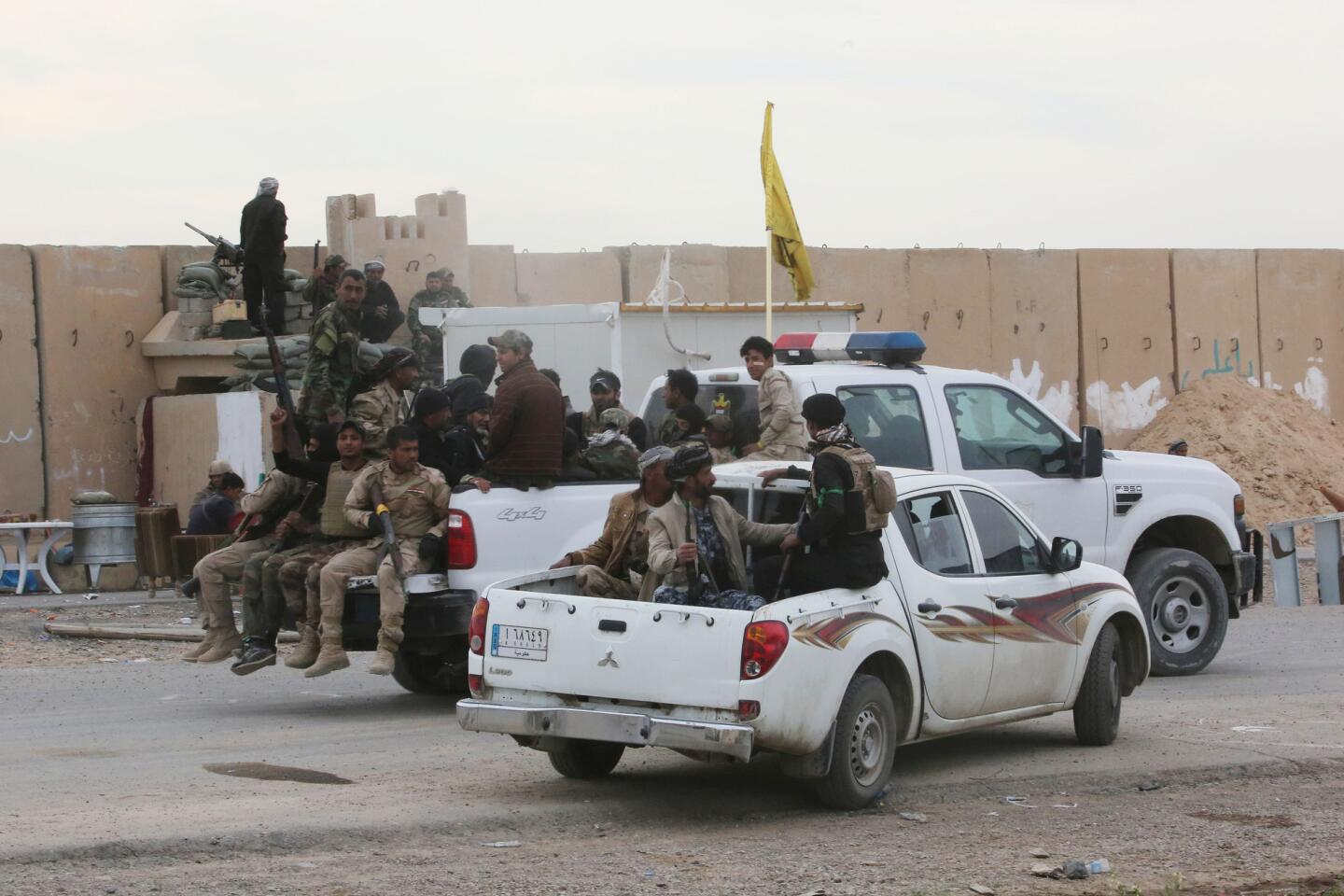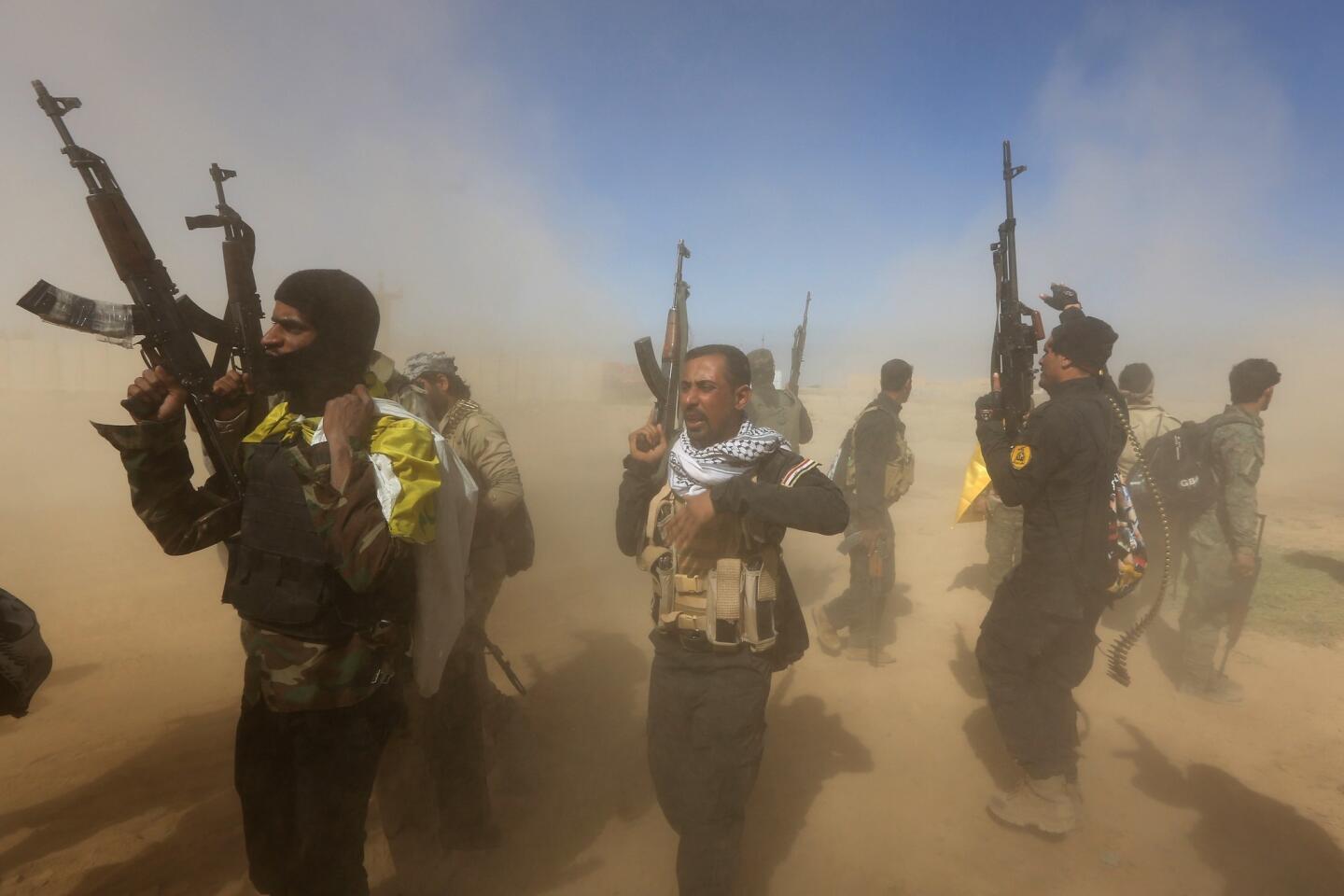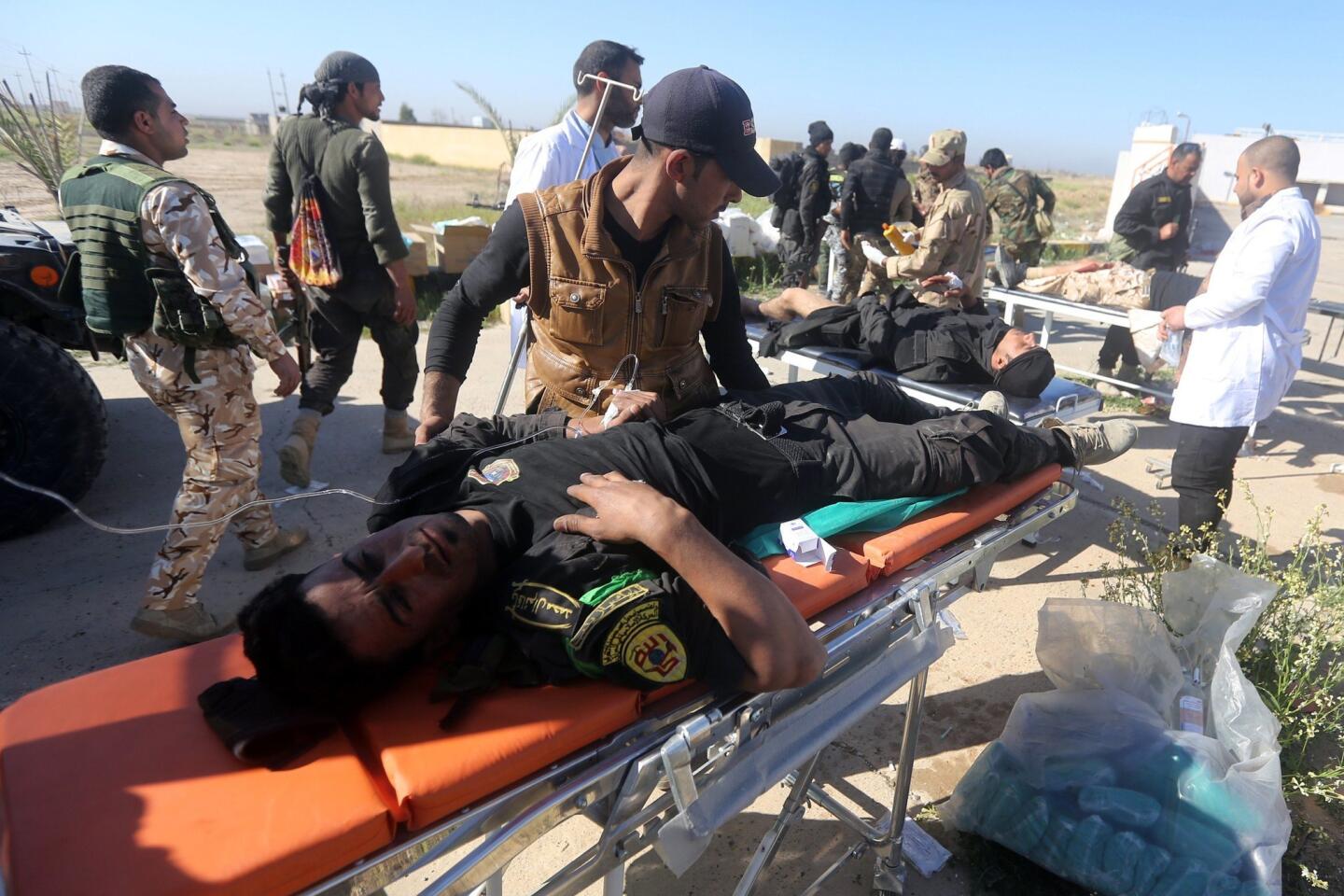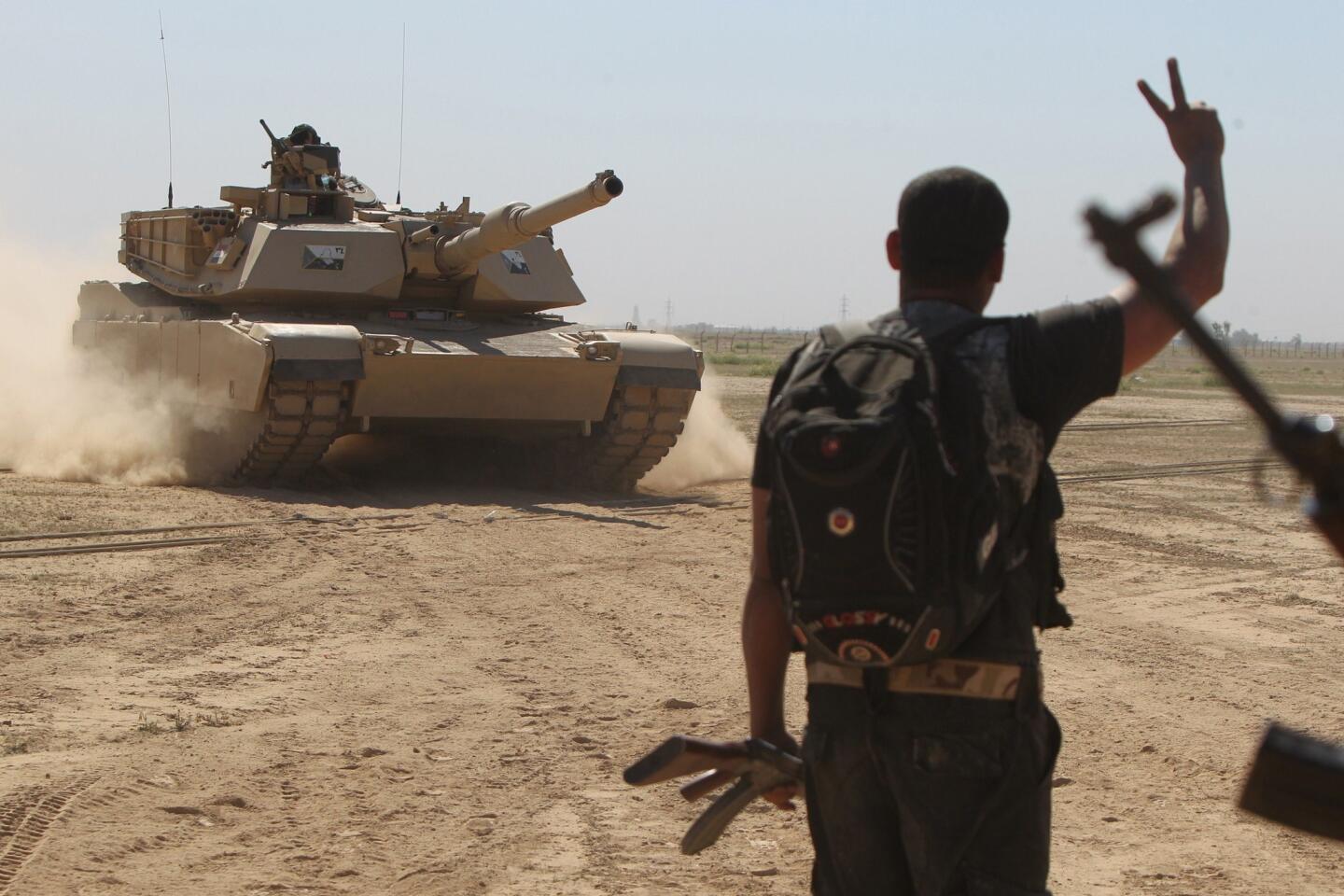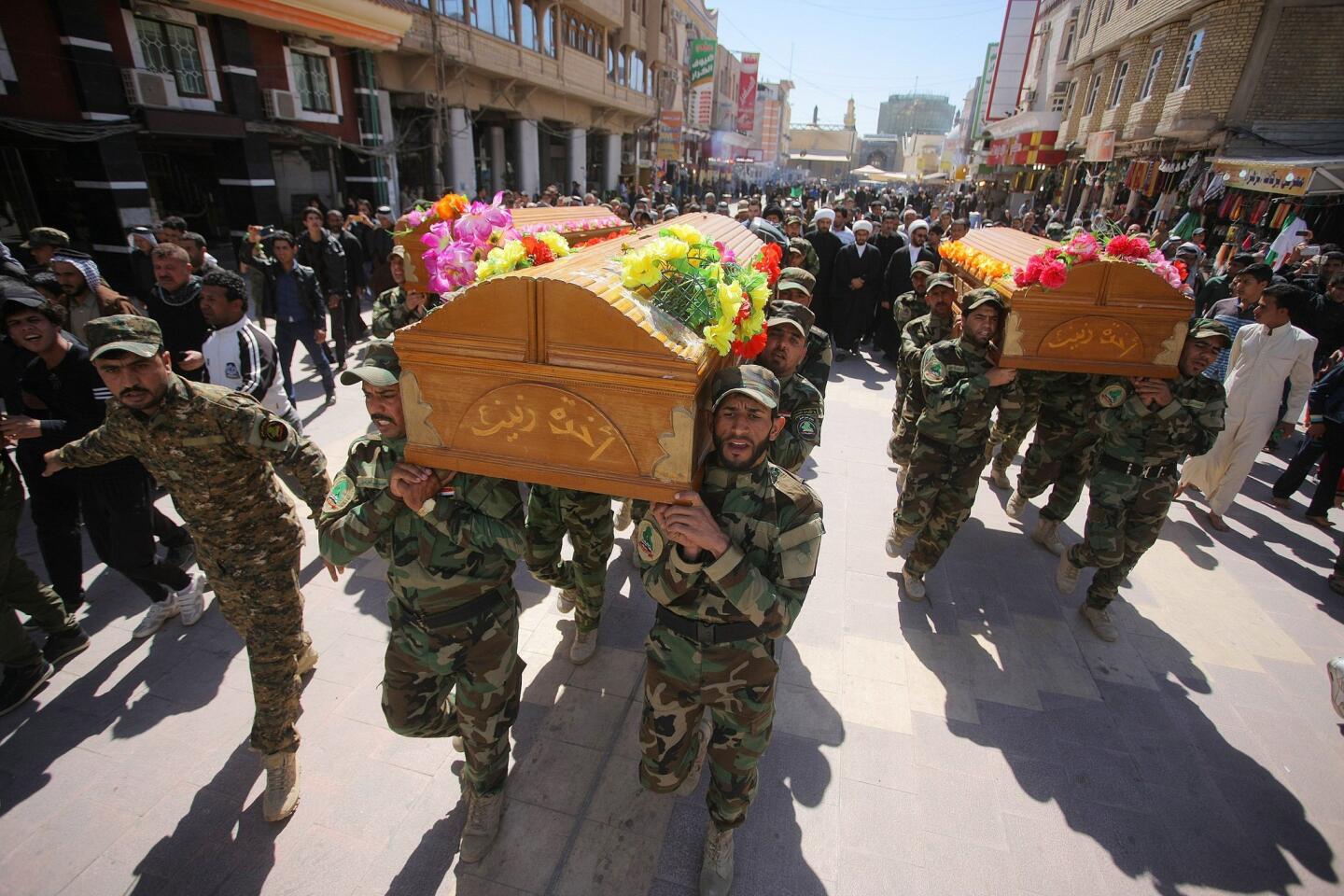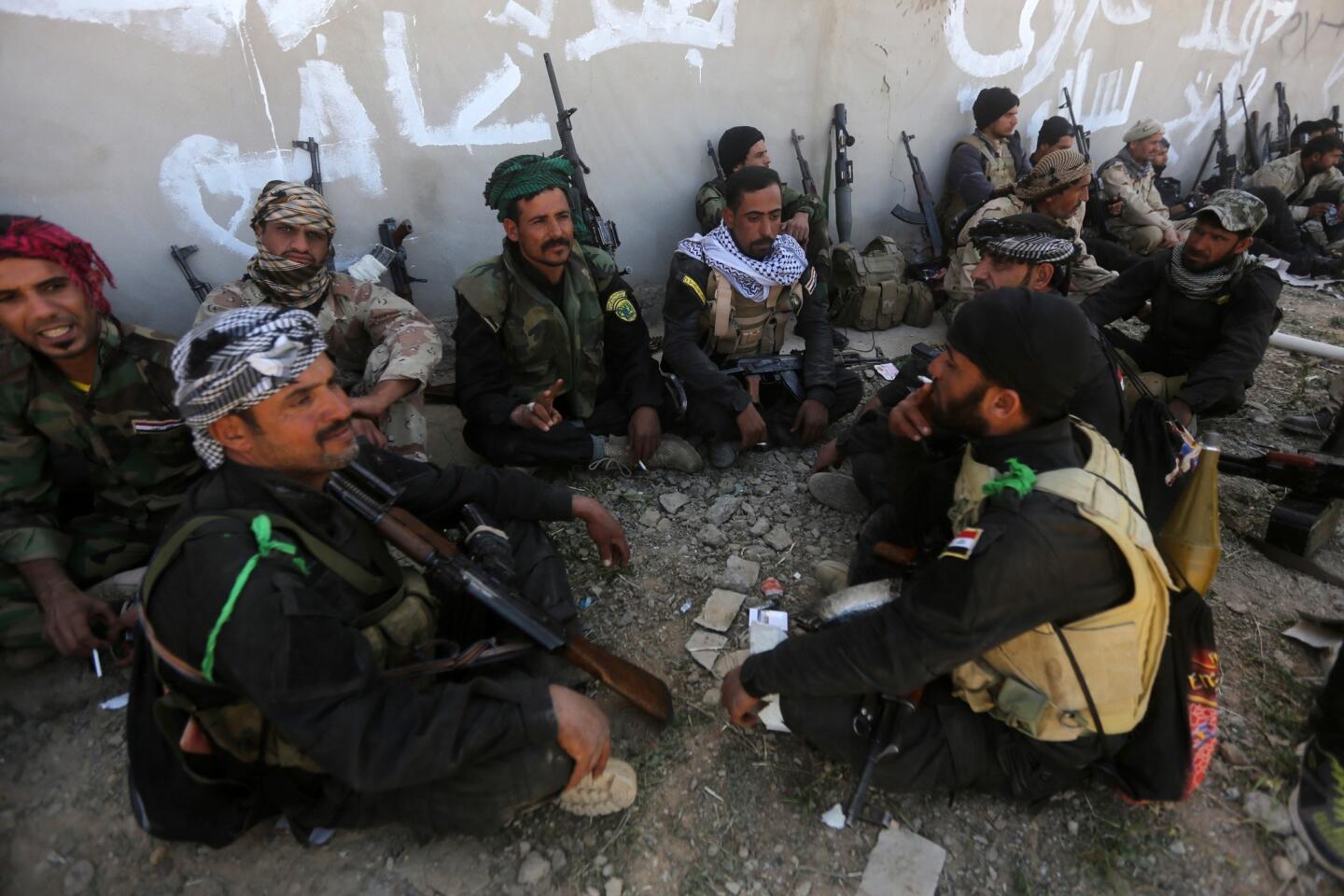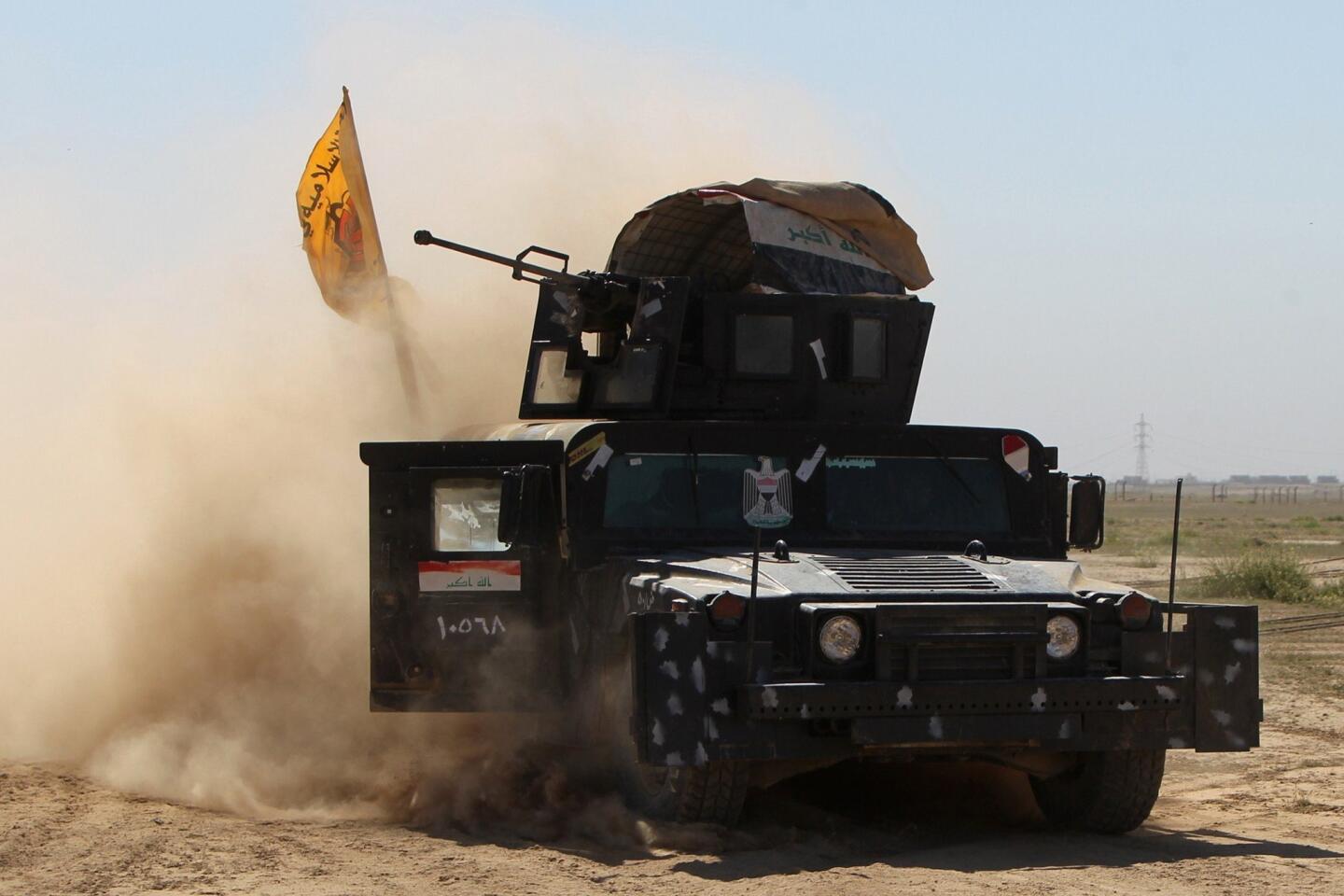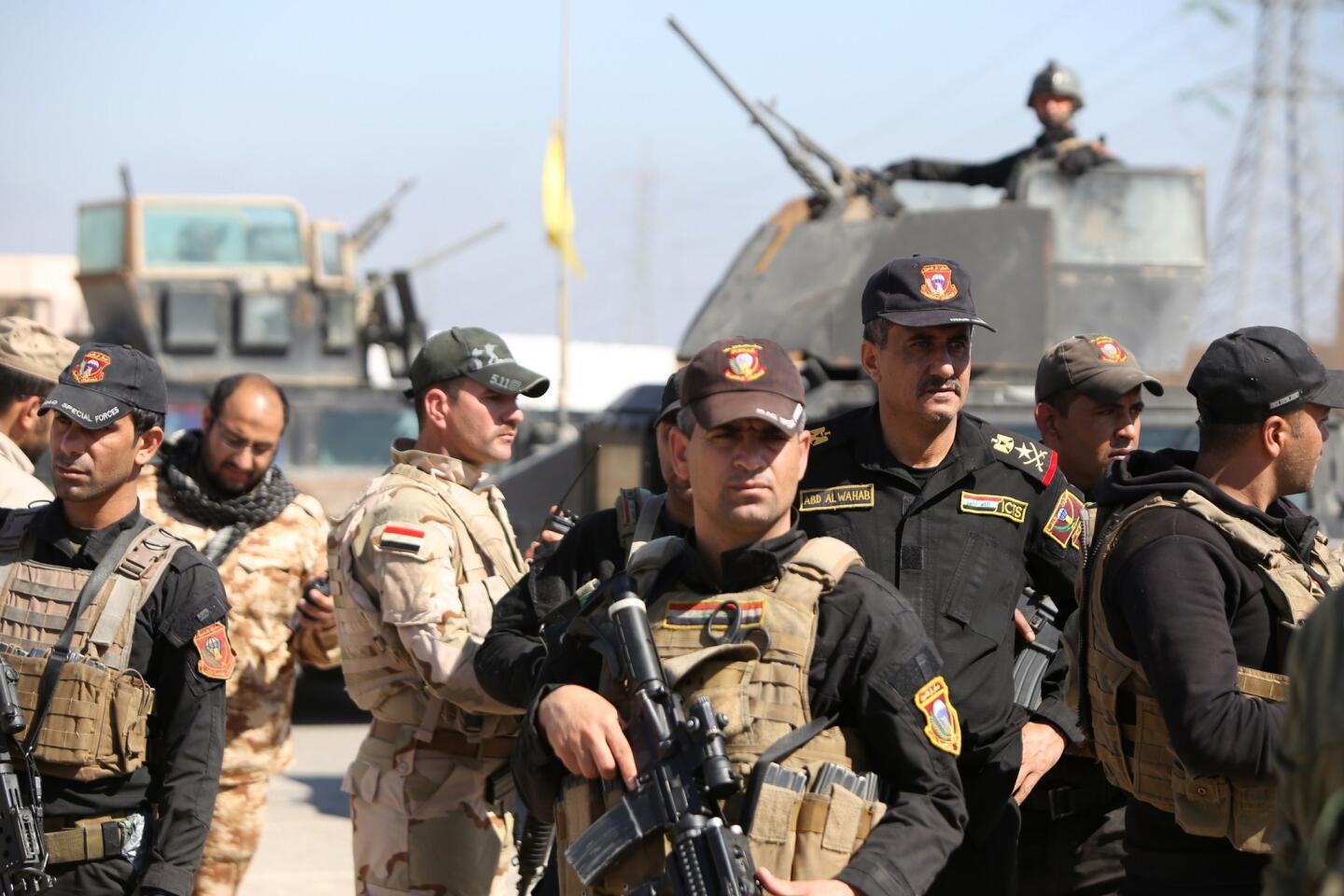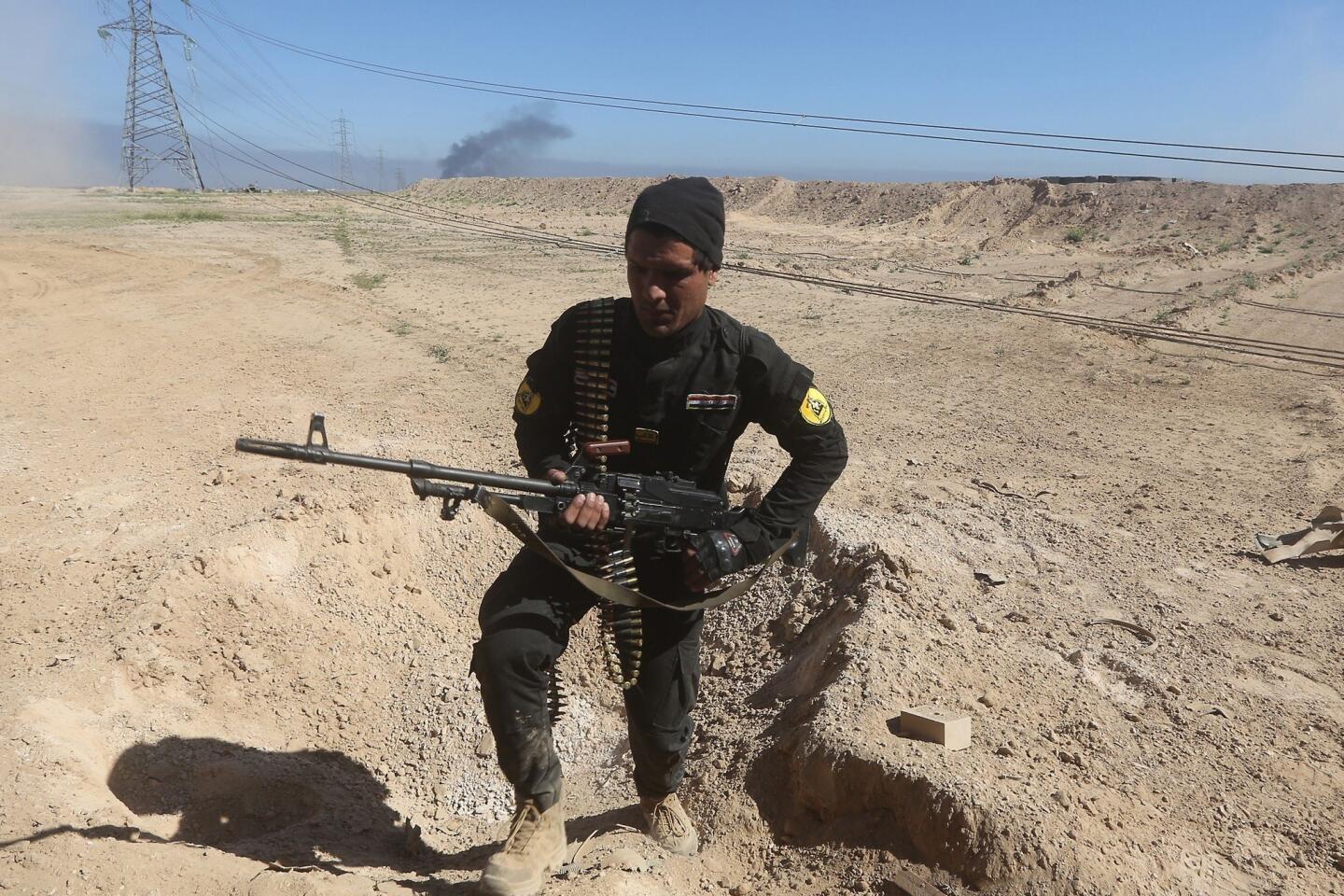Iraqi troops, Shiite militiamen push into Islamic State-held Tikrit
- Share via
Reporting from Dahuk, Iraq — Iraqi government troops and allied militiamen battled their way Wednesday into the city of Tikrit, threatening to deal a punishing blow to Islamic State militants in the hometown of former strongman Saddam Hussein.
Pro-government forces entered the city’s northern Qadisiya district and raised the Iraqi flag over government buildings amid cheers and rounds of celebratory gunfire, according to Al Iraqiya, the nation’s semiofficial news service.
The governor of surrounding Salahuddin province, Raed Jabouri, predicted a “great victory” and declared that troops would soon be thrusting into the center of the strategic and heavily symbolic city, 80 miles north of Baghdad, the Iraqi capital.
Other pro-government news sites and officials also cited significant advances into Tikrit. But it was not clear how far government forces had reached into the sprawling city, once home to more than 200,000 people, or whether they would be able to hold onto their gains.
“The fighting is ongoing and I think it will take some days before the picture is clear,” Hoshyar Zebari, a deputy prime minister, said in a telephone interview from Baghdad. “ISIS will not give up Tikrit so easily,” Zebari said, using a common acronym for Islamic State.
Even if government forces manage to regain Tikrit, experts say, such an outcome could prove a fleeting victory if the largely Sunni Muslim population refuses to back the Shiite-led central government in Baghdad.
“This is a war that is as much political as military, and the aftermath to any sort of tactical victory in Tikrit will be more important than the military victory,” said Anthony Cordesman, a senior military analyst at the Center for Strategic and International Studies, a Washington think tank. “Because it is how Iraqi Sunnis are treated ... that is likely to determine a lot of attitudes, including the attitudes of many people in Mosul.”
The Tikrit battle has been widely viewed as a test run for the more daunting government challenge of retaking Mosul, a much larger city about 140 miles up the Tigris River. Like Tikrit, Mosul’s population is largely Sunni Arab and has long been hostile to the government in Baghdad.
While most civilians are believed to have fled Tikrit, Mosul still has a significant civilian population — by some estimates as many as 800,000 people — and capturing it will probably involve complex urban warfare, experts say.
“We’re a ways away, frankly, from knowing how effective the Iraqi forces will be, how unified they’re going to be, and how well the Islamic State can hold together,” Cordesman said. “Quite aside from the military issues, it’s come under economic strain, it’s having more problems with its volunteers, and it’s having more problems providing services to the Sunnis that are within it.”
Though it has tried to cultivate an image of invincibility, Islamic State has suffered a number of setbacks. Kurdish militiamen, backed by U.S. air power, drove the militants from the northern Syria city of Kobani in January in a months-long battle. Iraqi forces also routed the militants from the eastern province of Diyala, which borders Iran.
However, Islamic State still controls significant territory in both Syria and Iraq, and also has the support of many Sunnis alienated by the central governments in Baghdad and Damascus. Islamic State is also believed to have access to revenue from smuggling, oil sales, extortion and kidnapping rings, among other enterprises.
Even as the militants appeared to be losing ground in Tikrit, they continued to mount punishing attacks elsewhere in Iraq.
In Ramadi, the provincial capital of Sunni-dominated Anbar province, more than a dozen car bombs exploded almost simultaneously Wednesday, killing at least two soldiers and wounding eight, according to news reports. Islamic State claimed in social media postings that it used foreign fighters from Australia, Belgium, Syria, Uzbekistan and the Caucasus region in the attack.
A car bomb also exploded in a Shiite neighborhood of northern Baghdad, killing seven people and wounding 18, authorities said. No one immediately claimed responsibility for that attack.
Snipers, suicide attacks and roadside bombs had slowed the progress of the nearly two-week offensive on Tikrit, the government’s largest to date against the militants who seized much of northern and western Iraq last summer in a series of attacks. But government forces Tuesday captured the town of Alam, north of Tikrit, opening a path into the city.
U.S. officials, who have backed the Baghdad government but are not directly involved in the Tikrit operation, appeared confident that loyalist forces would win back the city, a longtime hub of opposition against the U.S.-backed, Shiite-led administration in Baghdad.
In Washington, Gen. Martin Dempsey, chairman of the Joint Chiefs of Staff, said at a Senate hearing that “there is no doubt” that government forces would drive the militants out of Tikrit.
White House Press Secretary Josh Earnest told reporters that the Obama administration was “pleased” that the government forces were advancing. There were reports that some militant commanders were executing fighters to prevent them from defecting — “an indication of the significant pressure that’s being applied,” Earnest said.
As many as 30,000 Iraqi government forces and Iranian-backed Shiite militias, supported by a contingent of Sunni tribesmen, are converging on Tikrit, say Iraqi officials, who have celebrated the offensive as a source of national pride and honor.
The involvement of Shiite militiamen — who Dempsey said number about 20,000 fighters — and the reported presence of at least one major commander from Shiite Iran have raised concern about reprisal attacks by Shiites outraged by Islamic State slayings of hundreds of Shiite soldiers and police officers during the Al Qaeda breakaway faction’s summer onslaught.
Tikrit is close to a former U.S. and Iraqi military base, known as Camp Speicher, where the militants massacred hundreds of Iraqi security troops, mostly Shiites. At least one major Shiite militia leader has been quoted as calling for revenge for the incident. Many of the families of those presumed killed still do not know the exact fate of their loved ones and where their remains may lie.
Islamic State, a Sunni group that has declared a “caliphate” across a broad area of Iraq and neighboring Syria, views Shiites as apostates and has regularly killed Shiite civilians and fighters.
Prime Minister Haider Abadi, a Shiite, has repeatedly urged combatants to respect the rights of civilians.
Still, many Sunni representatives have voiced concern about reprisal attacks by Shiite fighters, who form the bulk of Iraq’s armed forces, police, and pro-government militias.
Various Shiite militias, some Iranian-backed, have become key elements of Iraq’s defense apparatus. Membership boomed after the U.S.-trained Iraqi army and police units retreated ignominiously in the face of the Islamic State advance last year.
With Baghdad seemingly threatened, leading Shiite clerics called on volunteers to enlist in defense of their country, a call heeded by multitudes of all ages.
The militias vary widely in battlefield skill and experience; members range from novices with little training to veterans with extensive experience in sectarian battlefields in Iraq and Syria.
The U.S.-led overthrow of Hussein, a Sunni, created a power vacuum in Iraq that resulted in a sectarian civil war in 2006-08 that left thousands dead. Hussein was hanged in 2006. Tension between the two sects remains high.
On Tuesday, the Muslim Scholars’ Commission in Iraq, a Sunni religious body, accused combatants affiliated with the League of the People of Righteousness, a prominent Shiite faction, of burning property belonging to Sunnis in the Albo Ujayl area near Tikrit. The group asserted that militiamen had uploaded videos depicting fires engulfing houses and commercial businesses as fighters cheered and sang sectarian chants.
Times staff writer McDonnell and special correspondent Bulos reported from Dahuk. Times staff writers Alexandra Zavis in Los Angeles and Brian Bennett in Washington contributed to this report.
Follow @mcdneville on Twitter for news out of the Middle East
More to Read
Sign up for Essential California
The most important California stories and recommendations in your inbox every morning.
You may occasionally receive promotional content from the Los Angeles Times.
